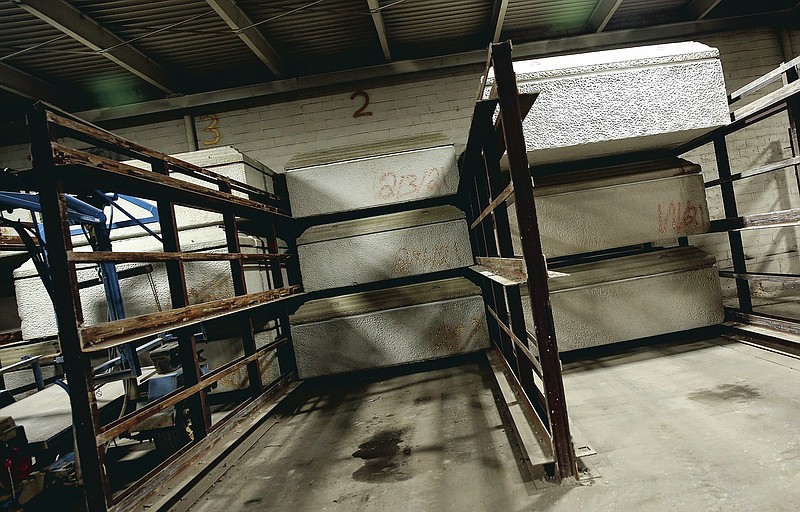MASON CITY, Iowa -- Daniel Clarke has spent 44 years making death a part of his life.
When he started with the local branch of the Wilbert Burial Vault Company, a non-descript light-brown building on an industrial stretch of Eighth Street Southwest in Mason City, Clarke was only in his early 20s. He took the job in part because it came recommended from a friend who worked there at the time and because he needed something that paid well to provide for his new wife.
Clarke stuck with it because of the sense of purpose the job offered.
"I liked helping people out and making sure their last request was taken care of and the family members were all happy with whatever I did out there. I just try to do my best for them," he said.
In the decades since Clarke first started with Wilbert, which has operated in the U.S. since 1880 and has four plants in Iowa, he's been the one of the last ones to see the casket lowered for children, Navy SEALs and even his wife. When he eventually goes, Clarke said he intends to be buried in a high-strength concrete, single-reinforced Venetian vault akin to his wife's.
As Clarke speaks about that inevitability, in a Chicago-style accent that's long on the letters "a" and "o," he doesn't register as weary. Even with something as heavy as having to preside over the interment of a child, Clarke offers context.
"There's a reason why. We don't know why but there's a reason," Clarke said.
Clarke is semi-retired from Wilbert now but still helps out plant manager Daniel Bowers however he can.
Bowers, 34, hasn't been there two years but already has picked up some of the same perspective that Clarke has about making a product that's an integral part of the burial process.
"When I first started, it seemed kind of tough to see families dealing with such a hard time but you do see a lot of togetherness and support for each other," Bowers said. He recalled that a few days ago a family was actually out at the cemetery just to see the vault sealed up. "That day, in particular, was more difficult," Bowers admitted.
Often, the most difficult part of the work is some of the more technical stuff.
Bowers, Clarke and their colleague Johnathon Rowe, who has been there a little less than a year and doesn't have quite as many stories as the other two, all acknowledged that hillside cemeteries are the toughest places to do work in.
"Especially one where grave plots are closer together," Clarke said.
Bowers noted that the elements can be brutal to deal with as well. According to him, cold days and rainy days are the toughest to make it through. And the days when machinery breaks down or graves start to cave in a bit.
If there's any downtime to be found during work, Bowers has tried in the past to take photos of the graveyards he visits (he studied photography in college). That happens a little less now because Bowers has already photographed so many cemeteries in the area he covers.
When Bowers wants to fully unwind from the work, he said he spends as much time with his family as possible. Watching his kids play with Play-Doh is more than enough of a source of joy for him. He said that his children haven't gone with him on many trips to the cemetery but that they do think the work is a bit strange. His wife has some context though: She previously worked for Hogan-Bremer-Moore as a licensed funeral director.
"She saw a job come up and thought I'd be perfect for it," Bowers said.
According to Bowers, exactly how many vaults are made in a week depends on how many services are scheduled in Wilbert's coverage area which can sometimes stretch up to Minnesota and as far east in Iowa as Lansing on the Mississippi River.
The crew aims to pour seven vaults in a day which takes two or three hours. The pour itself consists of concrete powder, chip rock and sand.
It takes another 12 or 16 hours for the burial vaults to set once they've been poured. And then the vaults might be in the warehouse for 30 days before they're sent out. Prior to departure, they can be stylized for specific people being buried. In a given month, Bowers figures that the crew makes 40 or 50 vaults.
"If we don't keep up on production, it can make things pretty difficult," Bowers said. "With the way covid has been, production has been difficult with all the services we're doing." Per Clarke, an eight or nine funeral day has happened before. That's when the work can really feel ratcheted up.
But again, even the most difficult moments for Bowers, Clarke and Rowe are tempered by context, perspective and time. Given long enough, some strange things can make more sense.
When Clarke was asked about whether or not it's eerie to open a grave back up, which he has had to do a few times to help with autopsies, he simply responded: "No. Don't bother me none."
Early into his time with Wilbert, Bowers had a job in West Union, which is the outer limits of where the crew goes on a more-regular basis. While chatting with a gravedigger, Bowers got a piece of advice that's stuck with him ever since.
"Just remember, no matter what happens in the day, we bury our problems here."




